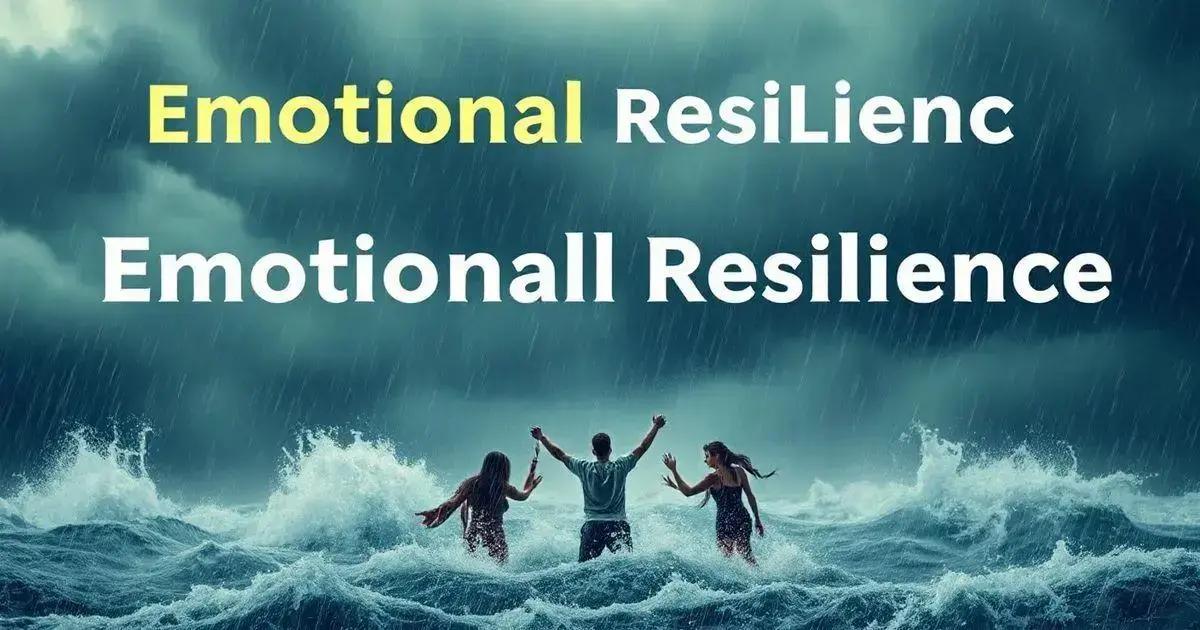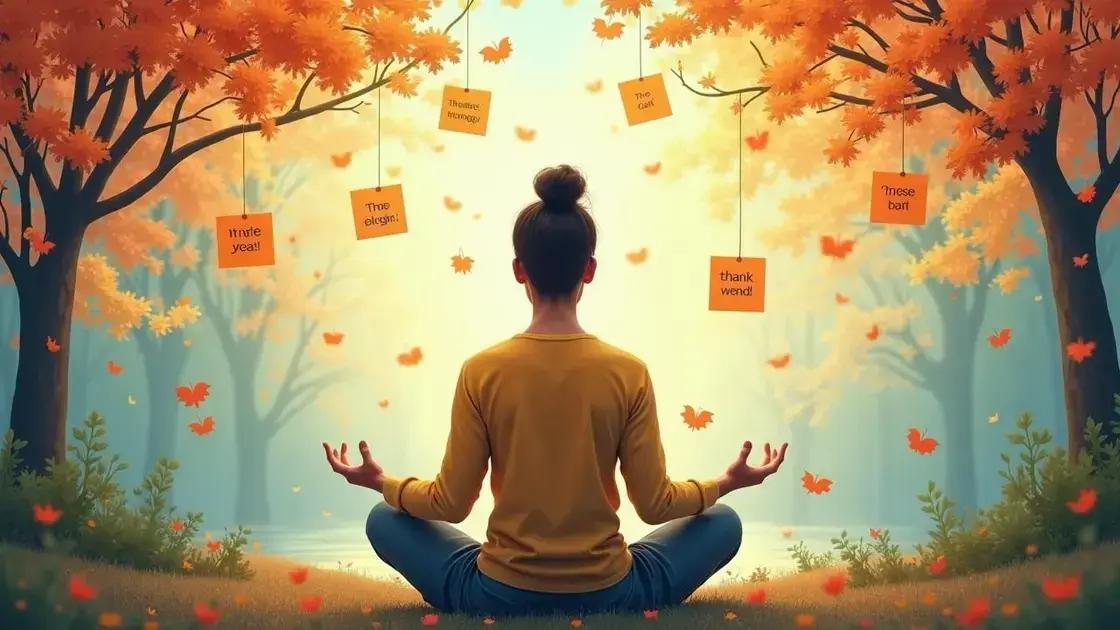The Benefits of Gratitude Practices for Emotional Resilience include improved mental health, stronger relationships, and a positive mindset. By regularly practicing gratitude, individuals can foster emotional resilience, reduce stress, and enhance overall well-being through simple actions like journaling, expressing thanks, and mindfulness techniques.
Gratitude practices are powerful tools that can significantly boost emotional resilience. By practicing gratitude, individuals can foster a positive mindset, improve their emotional well-being, and navigate life’s challenges more effectively. In this article, we will delve into the concept of emotional resilience, explore how gratitude practices enhance overall well-being, provide practical steps to incorporate gratitude into daily routines, and discuss how transforming your mindset through gratitude can lead to lasting change.
Understanding Emotional Resilience

Emotional resilience is the ability to adapt and bounce back from life’s stresses and challenges. It involves being able to maintain a positive outlook despite adversity. Understanding emotional resilience is vital because it allows individuals to face difficult situations with greater confidence and less fear. This quality helps people cope with challenges without feeling overwhelmed.
Being emotionally resilient doesn’t mean that a person won’t experience difficulty or distress. In fact, everyone faces hardships. However, emotionally resilient individuals are equipped with coping strategies that enable them to handle stress effectively. They tend to have a clearer perspective and can see challenges as opportunities for growth.
Components of Emotional Resilience
There are several key components of emotional resilience:
- Self-awareness: Understanding your emotions helps in managing them.
- Emotional regulation: The ability to control your responses to stress is essential for resilience.
- Optimism: Maintaining a hopeful outlook allows individuals to cope better.
- Social support: Building strong relationships provides a network of help during tough times.
- Coping strategies: Having effective methods to deal with stressors enhances resilience.
By fostering these components, individuals can build a strong foundation for emotional resilience. This foundation is beneficial not only in their personal lives but also in the workplace and community interactions.
How Gratitude Practices Enhance Well-Being

Gratitude practices play a significant role in enhancing well-being by shifting our focus from what we lack to what we have. When we regularly acknowledge the positive aspects of our lives, we can cultivate a richer and more fulfilling perspective. This shift not only boosts our mood but also impacts our physical health.
Benefits of Gratitude Practices: Research shows that expressing gratitude can lead to increased feelings of happiness and reduced symptoms of depression. People who engage in gratitude practices often report higher levels of life satisfaction. This is because focusing on the positive helps to counteract negative emotions.
Improved Relationships
Gratitude also plays a crucial role in fostering stronger relationships. When we express appreciation towards others, it strengthens our bonds and encourages individuals to reciprocate. Simple acts of thanking someone can enhance your social connections, making you feel more connected and supported.
Better Mental Health
Practicing gratitude can help combat anxiety and stress. When we focus on what we are grateful for, we reduce the amount of time spent on negative thoughts and worries. This practice encourages a more positive mindset, leading to lower levels of stress and improved mental clarity.
Enhanced Physical Health
Many people who regularly practice gratitude report better sleep and fewer health issues. Grateful individuals tend to take better care of their health, engaging in regular exercise and attending medical check-ups. This proactive approach to health can lead to increased longevity and a better overall quality of life.
Steps to Implement Gratitude in Daily Life

Implementing gratitude into your daily life can be simple and rewarding. Here are some effective steps to get started:
1. Start a Gratitude Journal
Keep a dedicated journal where you write down things you are grateful for every day. Aim for at least three items, big or small, and reflect on why these things bring you joy.
2. Set a Daily Reminder
Choose a specific time each day to pause and reflect on what you appreciate. Setting a reminder on your phone can help you make gratitude a daily habit.
3. Express Gratitude to Others
Take time to thank the people around you. Whether it’s a family member, a friend, or a colleague, expressing your thanks can strengthen your relationships and foster a positive atmosphere.
4. Practice Gratitude Meditation
Incorporate gratitude into your meditation or mindfulness practice. Spend a few minutes focusing on the things you are grateful for, allowing these positive thoughts to fill your mind and enhance your mood.
5. Share Your Gratitude
Discuss your gratitude with others. Sharing positive experiences can help amplify the feelings of thankfulness and inspire others to practice gratitude as well.
6. Create Visual Reminders
Place reminders around your home or workspace that prompt you to think about things you are grateful for. This could be post-it notes, pictures, or quotes that inspire gratitude.
Transforming Your Mindset through Gratitude

Transforming your mindset through gratitude involves changing how you view your experiences and interactions. By focusing on gratitude, you can shift from negative thoughts to a more positive outlook on life.
Recognizing Positive Moments
Begin by acknowledging the small positive moments in your day. Whether it’s enjoying a sunny day or savoring a delicious meal, taking time to notice these moments can enhance your mood and perspective.
Reframing Challenges
When faced with challenges, practice reframing them as opportunities for growth. Instead of viewing a setback as negative, consider what lessons you can learn from the experience. This perspective shift can build resilience and a sense of purpose.
Gratitude Affirmations
Incorporate gratitude affirmations into your daily routine. Start each day by stating things you are thankful for, which can create a positive frame of mind and set the tone for the day.
Mindfulness and Gratitude
Practice mindfulness by paying attention to your feelings and thoughts without judgment. Combine mindfulness techniques with gratitude by focusing on what you appreciate in the present moment. This helps reduce stress and promotes emotional well-being.
Visualizing Gratitude
Use visualization techniques to imagine scenes of gratitude in your life. Picture moments of joy or reflect on cherished memories. Visualization can reinforce positive feelings and help create a more grateful mindset.
In Summary: Harnessing the Power of Gratitude
Gratitude practices foster emotional resilience by helping us focus on the positives in our lives. Implementing gratitude doesn’t require significant changes; small, consistent actions can lead to meaningful results.
By understanding emotional resilience, enhancing well-being through gratitude, and applying practical steps in daily life, we can create a stronger, more resilient mindset. The ability to transform our perspective through gratitude improves not only our mental health but also our relationships and overall quality of life.
Embracing gratitude as a daily practice can lead to lasting emotional benefits, allowing us to navigate life’s ups and downs with greater ease and appreciation. Start your gratitude journey today, and experience the profound impact it can have on your emotional well-being.
FAQ – Frequently Asked Questions about Gratitude Practices
What are gratitude practices?
Gratitude practices involve regularly recognizing and appreciating the positive aspects of life, which can enhance emotional well-being.
How can I start practicing gratitude daily?
You can start by keeping a gratitude journal, setting daily reminders, and expressing gratitude to others for their contributions.
What are the benefits of gratitude practices?
Gratitude practices can lead to improved relationships, better mental health, reduced stress, and an overall increase in life satisfaction.
Can gratitude help with emotional resilience?
Yes, adopting gratitude can help shift your mindset, allowing you to respond to challenges more positively and enhance your emotional resilience.
How can I incorporate gratitude into my meditation practice?
You can focus on things you are thankful for during your meditation, allowing those positive thoughts to promote relaxation and emotional clarity.
Is there scientific evidence that gratitude practices work?
Yes, research has shown that practicing gratitude can improve mental health, increase happiness, and foster stronger social bonds.













